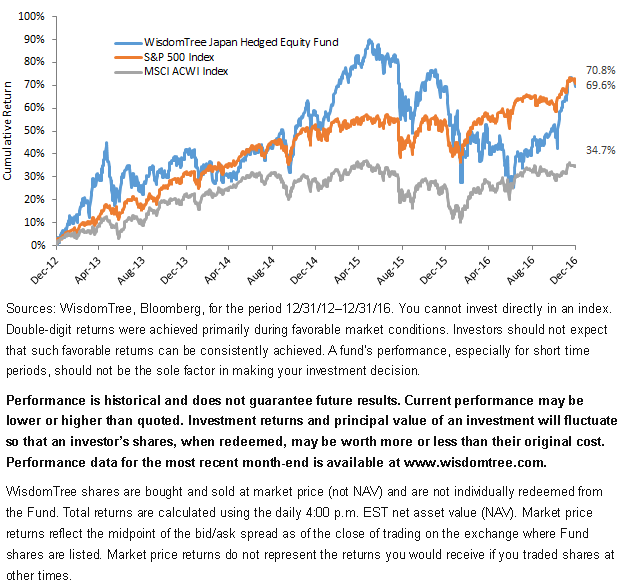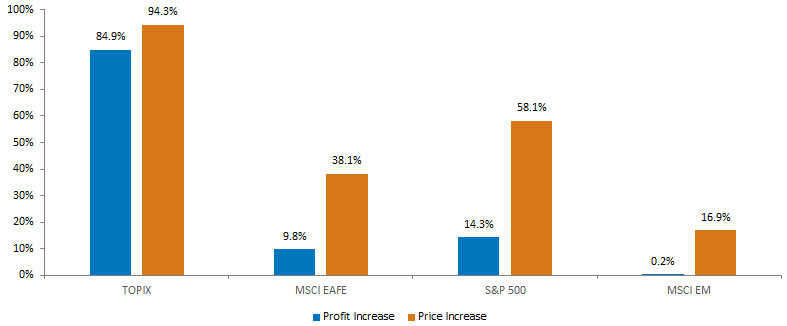Putting Global Winners in Perspective


Over the last four years, a constant refrain from many investors going overseas has been, “Why are we globally diversifying when the S&P 500 Index has been THE place to invest?”
The S&P 500 had a cumulative return that was double that of the MSCI All Country World Index, 70.8% vs. 34.7%, and had average annual returns of 14.3% per year vs. 7.73%.1
But it is after tough times for any market when prospects perhaps are more apt to turn around—because it takes a situation to turn from dreadful to “slightly less dreadful” for performance to improve quickly. Just look at Russia and Brazil last year.
And so it may be with the case for international investments—particularly the emerging markets, which have been the biggest laggards over the last four years.
Who Has Kept Pace With the U.S. and Why?
Japan, on a currency-hedged basis, was one of the few global markets (particularly among the largest 20 markets) that kept pace with the S&P 500 over the last four years.
In fact, the four-year returns for DXJ, the WisdomTree Japan Hedged Equity Fund, was nearly identical to the S&P 500 over the four years ending in 2016.

Japan, despite these strong gains over the full period, has been one of the tougher markets to hold over this period due to the higher volatility that comes with the country. Higher volatility theoretically creates opportunities for people to allocate more when prices fall, and remove weight when prices rise.
In many ways, the volatility levels of Japan rival that of other emerging market countries, as Japan tends to be more prone to global growth dynamics and global sentiment.
Why We Still Like Japan
One of the critical reasons WisdomTree still remains bullish in our outlook for Japan is that over this four-year period, the country kept pace with the U.S., and the U.S. market was driven by equity markets expanding in valuations (based on metrics like price to expected earnings, while Japan was driven by valuations contracting). Further, political stability is a hallmark of Japan today, while corporate governance has helped improve returns to shareholders through accelerated dividends and buybacks.
Price and Profit Growth


For definitions of terms and indexes in the chart, visit our glossary.
The U.S. is expected to have an earnings rebound in 2017. Part of this is a rebound in Energy sector earnings, and part of it is typically bullish company analysts’ expectations for corporate growth. Ultimately, some are starting to forecast an earnings stimulus plan with corporate tax cuts.
We recently discussed our modeling of tax cuts and found that earnings growth for the S&P 500 may be in the 7% to 15% range under a model we developed to estimate a tax impact. Of course, tax models are quite complex, and how the tax cuts are really implemented will greatly influence these outcomes.
Japan earnings estimates, in our opinion, are likely to also be revised higher in the coming months. Corporate Japan’s forecasts and much of the analyst expectations for earnings were based on assumptions of ¥103 to the U.S. dollar . With the current rates of ¥115,2 we might see 8% to 10% earnings growth from Japan, based on some work from our Japan CEO, Jesper Koll.
Volatile Markets
While we recognize Japan and the emerging markets are two areas that are tough to hold from a volatility perspective, that higher volatility may offer greater return potential to investors over time if they can look past the short-term ups and downs and look instead at long-term valuations and performance drivers.
Emerging markets have more risk levels, yes, so they typically sell at lower valuation multiples. But in our long-term research, market returns are driven by valuation multiples. The higher your valuation multiple, the lower the forward-looking prospect for returns. Lower valuation multiples can offer better potential for outperformance.
Recently, we discussed the benefits of combining exposures to Japan with the emerging markets. Over the coming four years, I believe there will be value to having meaningful allocations to these regions in global portfolios.
2Sources: WisdomTree, Bloomberg, as of 1/20/16.
Important Risks Related to this Article
Diversification does not eliminate the risk of experiencing investment losses.
There are risks associated with investing, including possible loss of principal. Foreign investing involves special risks, such as risk of loss from currency fluctuation or political or economic uncertainty; this may be heightened in emerging markets. The Fund focuses its investments in Japan, thereby increasing the impact of events and developments in Japan that can adversely affect performance. Investments in currency involve additional special risks, such as credit risk, interest rate fluctuations, derivative investments which can be volatile and may be less liquid than other securities, and more sensitive to the effect of varied economic conditions. As this Fund can have a high concentration in some issuers, the Fund can be adversely impacted by changes affecting those issuers. Due to the investment strategy of this Fund it may make higher capital gain distributions than other ETFs. Please read the Fund’s prospectus for specific details regarding the Fund’s risk profile.

Jeremy Schwartz has served as our Global Chief Investment Officer since November 2021 and leads WisdomTree’s investment strategy team in the construction of WisdomTree’s equity Indexes, quantitative active strategies and multi-asset Model Portfolios. Jeremy joined WisdomTree in May 2005 as a Senior Analyst, adding Deputy Director of Research to his responsibilities in February 2007. He served as Director of Research from October 2008 to October 2018 and as Global Head of Research from November 2018 to November 2021. Before joining WisdomTree, he was a head research assistant for Professor Jeremy Siegel and, in 2022, became his co-author on the sixth edition of the book Stocks for the Long Run. Jeremy is also co-author of the Financial Analysts Journal paper “What Happened to the Original Stocks in the S&P 500?” He received his B.S. in economics from The Wharton School of the University of Pennsylvania and hosts the Wharton Business Radio program Behind the Markets on SiriusXM 132. Jeremy is a member of the CFA Society of Philadelphia.

